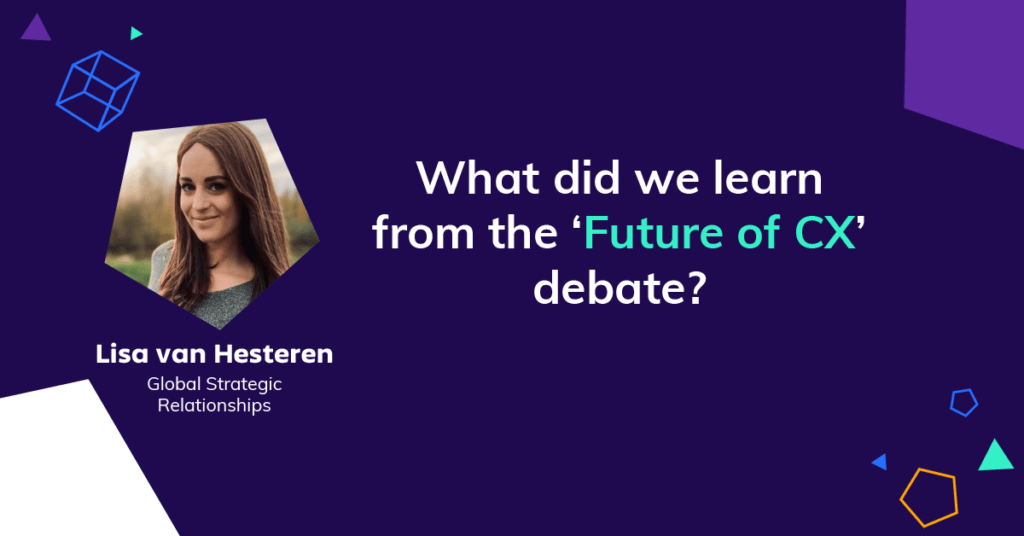21 May 2025
What did we learn from the ‘Future of CX’ debate?
Words by Lisa van Hesteren
Reading time 4 min

Words by Lisa van Hesteren
Reading time 4 min

If you were not able to attend “CX Strategy: What now?”, our panel debate from last week, then here it is. An insightful, thought-provoking hour with industry gurus Mark Hillary, Stephen Loynd, Peter Ryan and our own Robert Van Diem. Here are some of the themes that really stood out for us.

Our speakers all agreed that while WFH has been on the horizon for our industry for more than a decade now, the global pandemic has acted as an accelerant for our industry in the same way it has magnified behaviors and outcomes elsewhere.
The race that we’ve seen in the bricks-and-mortar CX industry to embed WFH this year has brought its own challenges, and there is a second wave of challenges coming for companies who have had to adapt rapidly this year.
We’ve all heard the industry anecdotes, where the technology has been copied but the management and engagement tools are all still based on traditional workplace environments rather than geared to working from home. The results are dropping engagement and productivity as ‘WFH Fatigue’ sets in.
As Peter Ryan says, “It’s easy to forget that people who went to work in bricks-and-mortar centers like meeting their colleagues”. They didn’t opt for home-working – it was thrust upon them, and the honeymoon is possibly over now.
As Robert says, “Working from home has to be right for your people. It’s a lifestyle choice. It’s not going to suit everyone.”
Robert talked about what we’ve learned at 5CA over two decades of pioneering WFH. Of course, you need to make sure you have the processes in place and your culture needs to adapt: transparency, a culture of trust, becoming more output-oriented, all these things are important. But actually wanting to work from home is the absolute key to success, because only some are suited to WFH and the disciplines that it requires. As Stephen Loynd says, “It’s an irony of exponential technological change that companies need to really know their people”.
The old days of needing to create a hub in a European city and then bring in – at considerable expense – linguists from all over the continent to staff it are gone. You simply don’t need to move people around Europe like that anymore and the result is a lower-cost, more scalable proposition.
The technology, processes and security are all robust enough so that you can plug people in wherever they are. They can work wherever they live, based in their own time zone. It makes you more flexible when you don’t have to commit resources to building the physical infrastructure of a hub.
Our panel of industry experts talked about the benefits of remote working, and Robert talked about how for 5CA, working from home makes everything else work. It means we’re able to recruit from anywhere in the world, because our people can work from anywhere in the world. Sounds simple, right? But that’s not the actual benefit for our clients. No, that comes with the increase in scalability we get from having a global talent pool to hire from. It means we can afford to be really picky, rather than have to rely on being lucky, hoping that the perfect candidate lives within commuting distance of the office.
That pickiness means in turn that we can afford to find and employ true fans of the brands we work for. For us, it’s a killer combination.
All our experts agreed that powering a client’s CX with agents who are fans of their brand could prove a game-changer for the industry as we hit the new decade. If you can harness the advocacy that an agent has for a brand, he or she is going to outperform anyone else in terms of passion and knowledge, because they believe in it.
Obviously, there are brands that are more suited for this than others. But anywhere you find bold, disruptive new challengers that are shaking up their industries, you’ll find fans evangelizing for these brands. Who doesn’t want to partner with those kinds of disruptors?
Given the wealth of survey feedback that enterprises continuously receive on their CX, our panel discussed the ongoing mystery of why so few actually act on it. Why would they let the disrupters get all the glory? Why wouldn’t you fix your CX if it wasn’t working? Particularly when the potential rewards are so huge in the form of ongoing customer loyalty and revenue generation across the customer lifecycle.
BPO used to be a “Your mess for less” business, as Peter pointed out. Nowadays that’s all changed, largely due to how CX management has changed. In an era when companies need to be able to pivot quickly, multi-sourcing is an obvious path. There are so many innovations that it’s hard for the enterprise to keep up, so now they might use multiple BPO partners to help them understand and innovate in terms of process, compliance, security, technology and anything else that supports them in staying ahead of their competition.
Eager to learn more? Please click here to watch the recording of the debate right away!